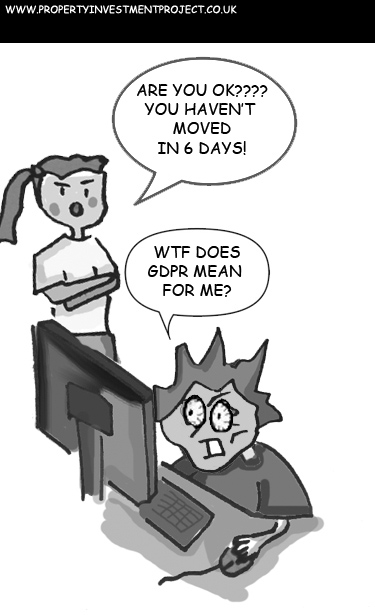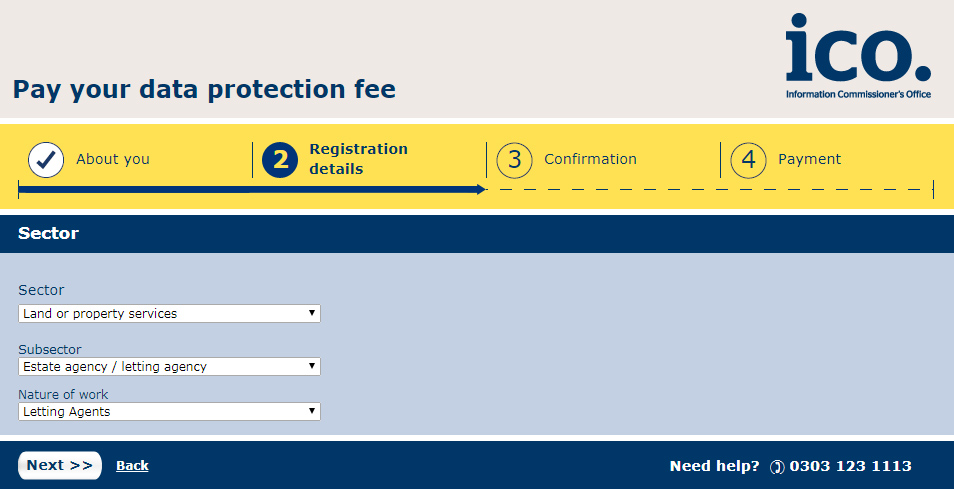
Yes, yes, yes! I know, I’m late to the freak show.
Apparently I should have written this blog post back in 1999. That is, according to the seven billion people that have emailed me, expressing their utter disappointment and growing disgust in my negligence of the matter, and how I failed to meet their impeccable expectations.
If you were one of those people, I didn’t reply because I felt too embarrassed to confess the bitter truth: “THE GDPR blog post… it’s coming… soon. Can’t confirm a day. But it’s coming. Stay tuned. It’s coming!”
Fortunately, while I’ve been sitting on the naughty-step I’ve had time to compose myself.
The fact is, I needed a moment to gather my thoughts and process the whole GDPR shit-storm. And by that, I mean wait until some other schmuck – that actually has a clue – to share some decent and digestible information that’s smooth enough for my feeble noggin to munch through and regurgitate.
Which leads me onto my next crucial point…
Here’s an obligatory disclaimer, so that my snotty, finger-twiddling, overpriced solicitor doesn’t roll me into a snot-ball and throw me out the window: I’m not a lawyer, so not even a single word contained in this blog post (or website, for that matter) should be construed as legal advice. The title of this blog post is actually missing a closing question mark and grunt, it should really be, “What Landlords need to do to comply with GDPR, aye?”
My objective is to simply share my opinions and thoughts on what GDPR is and how it affects ME as a landlord, including the steps I’ve taken to comply. If you want legal advice to ensure you’re covered, you should speak to a qualified professional. Happy spending!
And now, here’s my second disclaimer: I’m going to avoid getting into the legal technicalities of GDPR for the reasons mentioned in my first disclaimer, so fair warning, my attempt at simplifying complex information that’s way beyond my shockingly limited capacity may equate to a 1 year old reciting Quantum Mechanics.
I’ll try and stick to what I believe to be the need-to-knows for landlords, avoiding the background noise. So hopefully there won’t be any labour pains, just a baby tossed into your arms, albeit a gooey one. However, I will link to the more in-depth and – what I believe to be – notable resources below, for those that want to get hardcore with it. You’ll need matches and coffee for that journey, though!.
We good? We good.
Let’s go…
What is GDPR (General Data Protection Regulation)?
Ok, real quick…
The EU General Data Protection Regulation (GDPR) replaces the Data Protection Directive 95/46/EC and was designed to harmonize data privacy laws across Europe, to protect and empower all EU citizens data privacy and to reshape the way organizations across the region approach data privacy.
Source: https://www.eugdpr.org/eugdpr.org-1.html
In layman’s terms: GDPR is a new set of rules designed to give EU citizens more control over their personal data.
GDPR regulation came into effect on the 25th May 2018, and it’s scaring the shit out of people because the fines for failing to comply can reach up to a ridonculous €20 million or 4% of a company’s global annual turnover. So no need to panic, it’s only a shit-ton of money, and possibly our livelihoods.
Does it affect landlords?
Yup, because landlords typically use and store their tenants personal information (e.g. name, email address, phone number, menstrual cycle dates etc) in some form or another. Landlords are legally required to comply with GDPR, which is cool, because it’s not like we have enough legal obligations as it is.
Basically, as landlords, we need to process and control our tenants information in a transparent fashion, which includes explaining:
- What personal information we collect.
- Why we need their personal information.
- How we might use their personal information (including who the information might be shared with), and ensuring we only use it in that way (unless there are overriding legal precedence requiring the information).
- How long their personal information is retained for.
What am I going to do to comply?
Based on all the lengthy and confusing guff floating around, you’d think you’d have to shred a landfill worth of paper and perform brain surgery on a Raccoon to comply. But in practical terms – as far as landlords are concerned – there doesn’t seem to be too much to it, from what I can tell, anyways. I did the following two things…
- 1) Registered with the Information Commissioner’s Office
If you currently or at some point stored, used or deleted tenant personal information (e.g. name, email, telephone, address etc.) on any electrical device (e.g. computer, phone or tablet etc.) – which is most likely everyone with a pulse – then you should be registered with the ICO, and that’s actually regardless of GDPR.Registering with the ICO has always been required by landlords, but it wasn’t widely talked about or recognised until GDPR was a thing. It costs £35-40 per year (depending on payment method) to register. You can register here, or if you’re adamant on fighting the cost (all the power to you) you can use this tool to see if you’re exempt from registering (which you probably won’t be).
The registering process
The process is pretty straightforward, but I did get slightly confused by the “Sector” section of the application. Nothing really screamed “Landlord”, so I contacted ICO for guidance, and they advised me to select the following options:
ICO Registration, “Sector” options recommended for private landlords.
- 2) Use Privacy Policies where personal information is collected
This seems to be the most important step of complying. If we’re going to get bent over for GDPR negligence, it will probably have something to do with this.All the documents/forms used by agents/landlords that gather personal information from tenants should contain a privacy policy, clearly explaining ‘why’, ‘how’ and ‘for how long’ their information is controlled and processed.I’ve updated all the landlord documents available on this website that require personal information from tenants with a privacy policy, including the Tenancy Agreements, Guarantor Agreements, Tenancy Application form (free to download), and Guarantor Application form (free to download).For example, here is a snippet from the Privacy Policy in the tenancy application form:
Personal information which you have supplied may be used in a number of ways, for example:
- To make a decision about granting a tenancy
- To confirm identity and obtaining references
- For tenancy/licence agreement preparation
- Debt collection
- Providing references and the conduct of any tenancy in the future
- Providing information to utility companies or a local authority about any tenancy
Note that it doesn’t need to be written in old English from the 1200’s, like most of our legal guff is. Just plain old simple and clean English will suffice as long it makes sense.
Go ahead; download, adapt, use at your own risk, and stick it up your bum.
Oh, and please, please, please!!! If you’re already subscribed to my mailing list and you plan on downloading the free documents, use the same email address you’re subscribed with so you don’t resubscribe (otherwise you’ll double up on all my emails, and you’ll probably hate me for your own carelessness).

Anyways, what was all the GDPR fuss about, right?
During my ‘research’ phase, I glanced through the usual suspects for answers, including the RLA, and a few of the other heavy hitters… MY SHITTING-GOD, the shear depth of all the loosey-goosey ‘general’ information they’re flaunting on GDPR is, quite frankly, soul-destroying.
Personally, I didn’t need another GDPR manual, I just needed to know what I need to do in order to comply!
Sadly, I struggled to unearth guides explaining the practical steps required; I just kept bumping into endless reels and reels and reels and reels and reels and reels and reels and reels and reels and reels and reels and reels and reels and reels and reels and reels and reels and reels and reels and reels and reels and reels and reels and reels and reels and reels and reels and reels and reels and reels and reels and reels and reels…… of legislation that wasn’t really telling me anything.
It’s, like, they don’t even know we’re regular every day people… which means, by and large, we don’t give a flying fuck about the fluff!
I’m sorry, I’ve gone off on an awkward tangent. No wonder none of the other landlord webmasters invite me to the parties/gatherings/fancy black-tie dos.
Anyways, maybe I’ve misunderstood and/or oversimplified it, but they’re the two steps I’ve taken.
A word on “Consent”
The word “consent” has been deeply penetrated into almost all GDPR threads, so I just want to mention it in case you freak out because I didn’t.
“Consent” is a gigantic part of GDPR, and that’s precisely why we’ve all been email-bombed by companies, groveling for “consent” to remain on their shitty emailing lists so they can, ironically, continue bombing us with shitty marketing shit. I’m assuming they’re having to jump through those hoops because somewhere along the line they weren’t completely transparent with what they intended to do with our personal information.
So, anyways, do we need consent from tenants to process their personal information?
According to this article on the GRL, landlords are unlikely to require ‘consent’ to process personal information (don’t confuse that with the need to be transparent, though).
From what I understand, consent is not required if personal information will be processed under ‘legal requirement’, ‘contract’, ‘vital interest’ or ‘legitimate interests’, which pretty much covers the reasons for why landlords would process information while managing a tenancy, so we should be just fine without consent as long as we do our job as we’re supposed to. *high-five*
Again, from what I understand, consent is largely required for those that use any personal information for the purposes of sales or marketing. So, for example, if you’re the type of landlord that up-sells cutlery and bed linen to your tenants, then you’re probably the kind of asshole that will require consent before you’re able to continue doing so.
Additional notes
Existing tenancies
Couple of points and circumstances to consider here, and I’ll leave it up to you to decide which dusty road to walk down:
- If your existing tenancy agreement already has some form of privacy policy in place (which many do), then they might be sufficient for now (albeit, not as elaborate as the post-GDPR tenancy agreements available).
- As new tenants take over properties, the older tenancy contracts (which lack privacy policies) will eventually disappear.
- If you want to play it super safe, you could contact all your tenants with your shiny new privacy notice, explaining that your privacy policy for using their information has been updated.
Using a letting agent?
If you’re using a letting agent to manage the tenancy applications, they should take care of the privacy policies since they’ll be the be the one’s collecting and processing the data. Your agent’s privacy policies should state that they may share your tenant’s personal information with you, but yes, that’s their responsibility, not yours.
If you’re not using an agent to manage the applications, just ensure any of the documents you use to collect personal information from your tenants – prospective or otherwise – contain sufficient privacy policies.
Information requests
Under GDPR, tenants have the right to request details about the personal information you hold about them.
Remember, transparency is key!
Right to be forgotten
Tenants have a “right to be forgotten”, which means they can request for all the information you hold on them to be removed/deleted. However, where you are legally required to process information (e.g. ID to prove they have a right to rent), there is no right to erasure.
Recommended GDPR resources for landlords
I’m only going to recommend one resource produced by The Guild of Residential Landlords, because almost all the information in this blog post was accumulated from information available on their website, specifically this page (go there for a more in-depth explanation of GDPR). It was probably the only website which I came across which catered to my limited attention span and very limited ability to absorb boring shit.
Needless to say, if you’re looking for a good time and practical day-to-day landlording tips, then RIGHT HERE is home. However, if you’re serious about staying on top of all the landlord legal junk, then I can’t recommend becoming a member of The Guild of Residential Landlords enough. I’ve been recommending and endorsing them for a while now – they’re the best Landlord Association, in my opinion.
Any questions? Hope not!
If you have any questions regarding GDPR I hope I’ve made it abundantly clear that it’s not worth asking me. But drop it down in the comment section anyways, because maybe Adrian from GRL will stop by since I [willingly and deservedly] plugged his services, or perhaps someone else with a credible legal mind can assist.
If you feel I’ve missed anything out, if you feel there’s been an oversight, or if you did something different to comply, please drop a comment!
Hope this rides been usAful! xoxo
P.s. Apologies for the delay on getting this out! Writing about legal nonsense doesn’t really flow as easily as a dip-stick tenant that ruined my walls with anal warts. But that’s my curse, not yours.
Disclaimer: I'm just a landlord blogger; I'm 100% not qualified to give legal or financial advice. I'm a doofus. Any information I share is my unqualified opinion, and should never be construed as professional legal or financial advice. You should definitely get advice from a qualified professional for any legal or financial matters. For more information, please read my full disclaimer.


 Landlord Products / Services
Landlord Products / Services































Don't forget you should keep all Tenancy Agreements for at least 5-7 years in case you have to prove your income to the tax man.
I'm trying very hard to avoid contacting the ICO to see if I have to contact the past 7 years worth of tenants to give them our privacy policy...
PS, the avatar for Agent truly doesn't represent my current mood